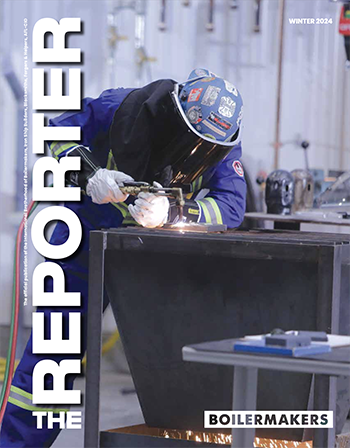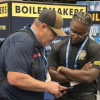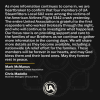Without your efforts…we simply wouldn’t have the Bipartisan Infrastructure Law and Inflation Reduction Act.
The Western States Section assembled Boilermaker leaders, contractors and employers in Santa Monica, California, April 8-9, for a tripartite conference. Leading topics focused on the future of energy and Boilermaker work, as well as safety.
The event has grown in popularity as a platform to learn about new developments in Boilermaker industries, present new information and initiatives and tackle concerns and challenges.
“The main focus of our tripartite conference is to find out how we can service our employers better,” said WS-IVP J. Tom Baca.
“Together we’re going to find solutions to the challenges we all face… Together, we’re going to find a way around the challenges to supply the necessary skilled manpower to man the work,” said International President Warren Fairley. “The whole concept of being better together is what makes that work.
“Skilled manpower is at the forefront of many of the conversations we have… We know it’s a concern for you, and I assure you it’s a focus for us.”
Highlighting that issue in a presentation about recruiting, growth and nationwide dispatching, Marketing Manager Johnny Baca quoted statistics from weldingworkforcedata.com: 330,000 new skilled welding professionals are projected to be needed in the United States within the next four years and 82,500 average welding jobs will need to be filled annually through 2028.
“If we don’t start selling people on joining the Boilermakers union, no one else is going to,” he said. “It is our responsibility to bring in new welders and new Boilermaker hands.”
He gave an overview of recruiting marketing tactics and the recruiting pipeline database, designed to get potential new Boilermakers moved more quickly into apprenticeship or onto jobs. He noted there were 13,000 people signed into the database indicating their interest in Boilermaker work, of which 3,000 are tube welders.
“We can’t just let these people sit in the database or make them wait until later,” he said.
IVP-Southeast Section Tim Simmons echoed the urgency to recruit and prepare more Boilermakers, and he pointed to the union’s proprietary nationwide referral system as integral to getting more Boilermakers on jobs and manning work whenever and wherever it is needed.
“According to the American Welding Society, the average age of a welder in the United States is 57 years old… You have an aging workforce that’s retiring, and we’re going to have to determine what we’re going to do to build a workforce that will come into this industry,” he said. “This is not just a Boilermaker problem, it’s a national problem.”
He talked about how the MOST Boilermaker Delivery System helps solve this by serving as a nationwide referral system to better fulfill the manpower needs of contractors and owners and keep Boilermakers working.
“It can assist—nationwide—referral agents from all over the country and make certain you have the people for the job you need, when you need them,” he said in describing how the dispatch system can serve as a data repository that makes it possible to identify and pull from qualified Boilermakers anywhere.
Building on the current MOST BDS, a new “Readiness for Work” program was outlined, stemming from the tripartite approach of addressing challenges together.
“This is a first-of-its-kind program with the support of contractors, and it originated right here at this tripartite as a solution in response to caucuses and the feedback we’ve gotten,” said Ed McWhorter, General Manager Western Operations for B&W, Chairman WFCNC, Western States Contractor Chairman.
He explained that the program will use an enhanced version of the MOST BDS discussed earlier by Simmons. The enhanced system will allow local lodges to see all qualified and available Boilermakers. It will also pull information on training that might be required for specific owners or job site and promote training opportunities to individual Boilermakers. Plans include establishing a training reimbursement process to encourage more Boilermakers to take advantage of training and providing stipends for Boilermakers to take welding tests, training, cover travel costs and similar expenses.
“This is going to be a game changer,” McWhorter said. “It’s an immense task, and every local will need to look to every owner to identify training requirements.”
IVP Baca said it’s all designed to get more Boilermakers prepared and on jobs to work for the union’s contractors and employers. He noted the Western States could serve as a template for scale-up across the rest of the U.S.
“We want to be able to send Boilermakers out immediately. Wherever they are across the country and wherever there’s a need, we’ll be able to dispatch immediately,” he said. “We come out to go to work and get the job done.
“We’re continuing to change with new energy and new project needs,” he said. “People were afraid we’d go away when the locomotive changed from steam. But we embraced it, and we’ll continue to change with the times. We always have, and there will always be a need for Boilermaker skills.”
Also addressing the topic of recruitment and fulfilling the demand for skilled Boilermakers, International Secretary-Treasurer Kathy Stapp zeroed in on the importance of recruiting more women in the industry.
“We need to be able to staff the work that’s coming, and this creates a unique challenge and opportunity to bring more women into this industry,” she said. “I want to see more women in Boilermaker jobs, and I’m concerned about the short term and long term—getting them to stay.”
She said that in addition to promoting to women that Boilermaker work offers career advancement and pays well (and, through a union contract, pays equally regardless of gender) local lodges should allow space for women and allies (male or female) to meet and share concerns and ideas. Stapp also said it’s important for the union to address challenges women face in the industry, such as properly fitting personal protection equipment and other safety issues.
No surprise to anyone who has paid even a little attention to the news, federal funding for U.S. infrastructure and clean energy projects has fueled an increased demand for a skilled, trained—and union—workforce.
Brad Crabtree, Assistant Secretary in the Department of Energy’s Office of Fossil Energy and Carbon Management gave an update on the energy transformation happening in the industry. He praised the Boilermakers union for decades of work advocating for carbon capture and other clean energy solutions as key to the bipartisan support needed for improvements to the 45Q tax credit and other federal policies that buoyed the more recent infrastructure measures.
“In fact, your early and persistent leadership at the Boilermakers was instrumental. It helped elevate an increase bipartisan congressional support for carbon capture and storage,” he said. “Without your efforts…we simply wouldn’t have the Bipartisan Infrastructure Law and Inflation Reduction Act. Together they’ve created the most robust policy framework in the world for carbon management and industrial decarbonization, and it helped, I think, lay the foundation for the resurgence of American industrial production and manufacturing.”
He noted that, also factoring in the Chips and Sciences Act, there are an estimated 800,000 high paying jobs expected to come online as a result of federal funding. He said an anticipated 56,000 will come from managing carbon capture systems.
“This is not just about getting funds out the door but ensuring that workers—your members and other unions and communities adjacent to these facilities—that they see real economic and environmental benefit from building these projects out,” Crabtree said. “Working men and women directly benefit.”
Sarah Saltzer, Ph.D., Managing Director of Stanford Center for Carbon Storage, focused her keynote remarks on the path to carbon neutrality, and Billy Afghan, founding partner and CEO of Genii Earth led attendees through exercises for leadership to overcome perceived roadblocks, identify and focus goals, and maximize ideas and opportunities.
And with safety as a top priority for everyone, Steve Giffin, who is the Maintenance, Turnaround and Construction Manager for the PBF Martinez Refinery and serves as Western States Owner Chairman, emphasized three key points to keep everyone safe on the job: inherent respect for people, investment in training people for the job and the tools they use, and the right leaders who create a good culture.
“We’re all working for the same goal: Nobody gets hurt,” he said. “One goal means one team. We cooperate, we don’t compete.”
Other speakers included Chris Hannan, President of the State Building and Construction Trades Council of California; Erin Lehane, Western States Director of Political Affairs; Collin Keisling, Western States Joint Apprenticeship Program Area Coordinator; and Mark Garrett, MOST Programs Administrator.
As has been the practice for years, Boilermakers, contractors and employers broke into caucus sessions to identify and discuss concerns. Each caucus was then represented to report their findings to the full conference for ongoing consideration.








